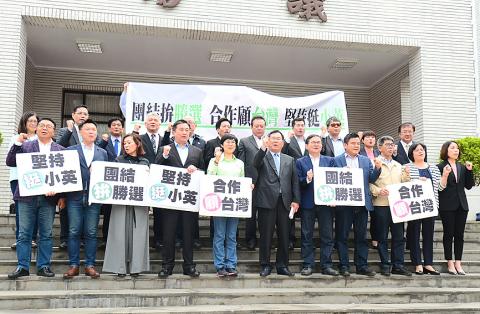At least 34 Democratic Progressive Party (DPP) lawmakers yesterday signed a letter supporting for President Tsai Ing-wen’s (蔡英文) re-election next year.
In the morning, 27 DPP lawmakers stood outside the Legislative Yuan in Taipei holding placards to express their support for the president’s re-election bid.
The public showing of support for Tsai came one day after former premier William Lai (賴清德) announced that he would to seek the party’s nomination for next year’s presidential election.

Photo: Wang Yi-sung, Taipei Times
“Cooperate for the sake of Taiwan, come together to win the election, persevere in support of Tsai Ing-wen,” the group shouted.
“Those of us standing here today represent the worries of the party’s grassroots supporters. Only by standing with Tsai can we protect the party and protect Taiwan,” DPP Legislator Chen Ming-wen (陳明文) said.
The group, which included members of the Taiwan Normal Country Promotion Association, as well as supporters of Premier Su Tseng-chang (蘇貞昌) and former premier Frank Hsieh (謝長廷), said that they were spurred by media reports about the DPP, actions by minority parties and growing concerns among supporters about the state of the party and the future of the nation.
The Chinese Nationalist Party (KMT) and certain media outlets have been using every opportunity to cause rifts in the DPP and to weaken localization efforts, Chen said.
Supporting Tsai is necessary to counter these trends, he said.
The nation urgently needs to respond to growing threats from China, particularly given Beijing’s expressed resolve to force the “one country, two systems” framework on Taiwan, he added.
Tsai has been bravely facing these challenges and has put Taiwan on the right path, the economy has begun to grow and other nations have started showing greater support for Taiwan under her leadership, Chen said.
However, these achievements have also made Tsai a target for Beijing and the KMT, which have attacked her reforms, he said.
Tsai needs support so that she will not have to face such challenges alone, Chen said, adding that she already has the support of Su, who has solved many issues left from previous administrations since he became premier.
Meanwhile, Tsai told reporters in Taipei on the sidelines of a meeting on information security that she would not let her re-election campaign affect her performance.
“The nation has changed significantly since the Sunflower movement five years ago. We are now on the correct path and we can absolutely continue moving forward together,” said Tsai, who last month announced her intention to seek re-election.
Separately yesterday, the Central Election Commission announced that the presidential and legislative elections would be held on Jan. 11.

Taiwanese can file complaints with the Tourism Administration to report travel agencies if their activities caused termination of a person’s citizenship, Mainland Affairs Council Minister Chiu Chui-cheng (邱垂正) said yesterday, after a podcaster highlighted a case in which a person’s citizenship was canceled for receiving a single-use Chinese passport to enter Russia. The council is aware of incidents in which people who signed up through Chinese travel agencies for tours of Russia were told they could obtain Russian visas and fast-track border clearance, Chiu told reporters on the sidelines of an event in Taipei. However, the travel agencies actually applied

New measures aimed at making Taiwan more attractive to foreign professionals came into effect this month, the National Development Council said yesterday. Among the changes, international students at Taiwanese universities would be able to work in Taiwan without a work permit in the two years after they graduate, explainer materials provided by the council said. In addition, foreign nationals who graduated from one of the world’s top 200 universities within the past five years can also apply for a two-year open work permit. Previously, those graduates would have needed to apply for a work permit using point-based criteria or have a Taiwanese company

The Shilin District Prosecutors’ Office yesterday indicted two Taiwanese and issued a wanted notice for Pete Liu (劉作虎), founder of Shenzhen-based smartphone manufacturer OnePlus Technology Co (萬普拉斯科技), for allegedly contravening the Act Governing Relations Between the People of the Taiwan Area and the Mainland Area (臺灣地區與大陸地區人民關係條例) by poaching 70 engineers in Taiwan. Liu allegedly traveled to Taiwan at the end of 2014 and met with a Taiwanese man surnamed Lin (林) to discuss establishing a mobile software research and development (R&D) team in Taiwan, prosecutors said. Without approval from the government, Lin, following Liu’s instructions, recruited more than 70 software

Taiwanese singer Jay Chou (周杰倫) plans to take to the courts of the Australian Open for the first time as a competitor in the high-stakes 1 Point Slam. The Australian Open yesterday afternoon announced the news on its official Instagram account, welcoming Chou — who celebrates his 47th birthday on Sunday — to the star-studded lineup of the tournament’s signature warm-up event. “From being the King of Mandarin Pop filling stadiums with his music to being Kato from The Green Hornet and now shifting focus to being a dedicated tennis player — welcome @jaychou to the 1 Point Slam and #AusOpen,” the